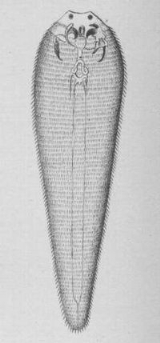
Pentastomida
Overview
Pentastomida are an enigmatic group of parasitic invertebrate
s commonly known as tongue worms due to the resemblance of the species of the genus Linguatula to a vertebrate tongue
.
There are about 130 extant species of pentastomids; all are obligate parasite
s with correspondingly degenerate anatomy. Adult tongue worms vary from about 1 to 14 cm (0.393700787401575 to 5.5 ) in length, and parasitise the respiratory tract
s of vertebrate
s.
Invertebrate
An invertebrate is an animal without a backbone. The group includes 97% of all animal species – all animals except those in the chordate subphylum Vertebrata .Invertebrates form a paraphyletic group...
s commonly known as tongue worms due to the resemblance of the species of the genus Linguatula to a vertebrate tongue
Tongue
The tongue is a muscular hydrostat on the floors of the mouths of most vertebrates which manipulates food for mastication. It is the primary organ of taste , as much of the upper surface of the tongue is covered in papillae and taste buds. It is sensitive and kept moist by saliva, and is richly...
.
There are about 130 extant species of pentastomids; all are obligate parasite
Obligate parasite
An obligate parasite is a parasitic organism that cannot complete its life cycle without dependence on its host.-See also:*Obligate intracellular parasite*Parasitism*Parasitic plant*Facultative parasite...
s with correspondingly degenerate anatomy. Adult tongue worms vary from about 1 to 14 cm (0.393700787401575 to 5.5 ) in length, and parasitise the respiratory tract
Respiratory tract
In humans the respiratory tract is the part of the anatomy involved with the process of respiration.The respiratory tract is divided into 3 segments:*Upper respiratory tract: nose and nasal passages, paranasal sinuses, and throat or pharynx...
s of vertebrate
Vertebrate
Vertebrates are animals that are members of the subphylum Vertebrata . Vertebrates are the largest group of chordates, with currently about 58,000 species described. Vertebrates include the jawless fishes, bony fishes, sharks and rays, amphibians, reptiles, mammals, and birds...
s.

